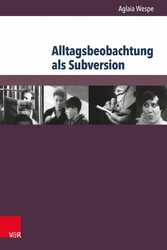Suchen und Finden
Alltagsbeobachtung als Subversion - Leningrader Dokumentarfilm im Spätsozialismus
Eine »Heldin der Arbeit« kommt aus der Textilfabrik nach Hause und setzt sich erschöpft und weinend in den Flur. Diese Szene spielt sich in einem der sowjetischen Dokumentarfilme ab, die Aglaia Wespe in dieser Studie untersucht. Die Filme, die aus den 1970er Jahren stammen und weitgehend unbekannt geblieben sind, zeigen Menschen in Alltagssituationen, ohne Errungenschaften des sozialistischen Systems anzupreisen. Durch den Verzicht auf ideologische Aussagen klingt so eine subtile Gesellschaftskritik an und die filmischen Alltagsbeobachtungen werden, wie Aglaia Wespe eindrucksvoll zeigt, zur Subversion. This book investigates gender roles in the everyday life of the late Soviet Union through an exploration of documentary films produced in Leningrad. The films do not only show official aspects of communism but also provide insights into the lives and problems of Soviet citizens. The film Mother is a Hero of Labour (Na?a mama - geroj, dir.: Nikolaj Obuhovic, 1979) for example portrays a textile worker in Ivanovno. It shows the main character not only at work in her combinate and at assemblies of the communist party, but also when she is coming home crying from tiredness. The analysis of the unique film material presents important insights into Soviet society of the 1970s. In addition looking at the films themselves the author elaborates methods for the analysis of audiovisual sources within history.
Dr. Aglaia Wespe verfasste die Dissertation am Departement Geschichte der Universität Basel in einem Forschungsprojekt des Schweizerischen Nationalfonds. Sie arbeitet als freischaffende Historikerin.
Alle Preise verstehen sich inklusive der gesetzlichen MwSt.











